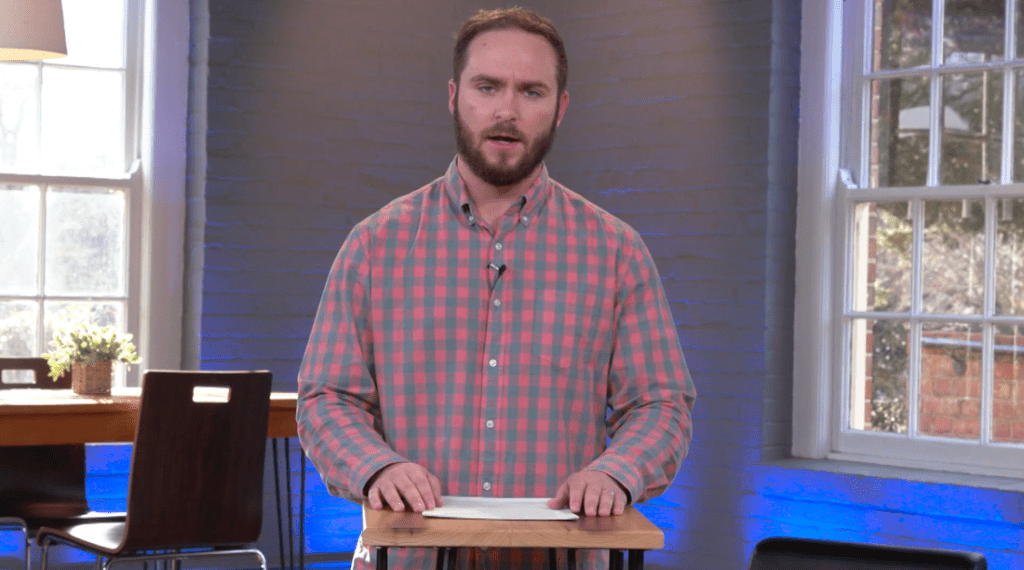Whenever you meet atheists, chances are they’ll have some religious deconversion story at the ready. Many of us who had religious upbringings abandoned them after a dose of critical thinking, reading a book explaining the problems with organized religion, or recognizing religious hypocrisy. But there’s a different — and growing — group of people who went on a similar journey but didn’t leave religion at all. Instead, they ended up with a new, freer form of faith.
Jordan Steffaniak doesn’t seem to think that’s a possibility.

Steffaniak, a graduate of Southeastern Baptist Theological Seminary, says that he nearly deconstructed when he realized the evangelical world at large “appeared to be completely void of intellectual substance.” But with the help of an evangelical mentor, he examined his faith and ended up even stronger in it. (And so can you!)
He says he was put off by the shallowness and superficiality of the church, what with the “pop music, self-help talks, and overnight video game extravaganzas.” What brought him back into the fold was engaging with “intellectual giants” of the theological world.
While I can’t take issue with his personal journey, there’s much to criticize when it comes to Steffaniak’s definition of “deconstruction” and his description of the Exvangelical community.
By deconstruction I mean the practice of re-examining previous beliefs and ultimately rejecting them, and by exvangelical I mean those who have deconstructed from their previous evangelical beliefs.
He added that exvangelicals “praise the glories of deconstruction.”
But those aren’t fair descriptions of the process or those who step away from the church. Here’s self-proclaimed #Exvangelical Daniel Griffin explaining why those definitions are wrong:
Apparently, deconstruction is poison. A poison that @JLSteffaniak narrowly avoided. I'm sure that evangelicals and authoritarian Christians see it as poisonous. Shall we discuss? Thread: 1/https://t.co/VN16sLxRIq
— Daniel Griffin (@HC_Exvangelical) May 24, 2021
… By using “Praise” and “Glory” Jordan is directing his intended audience to see ex-evangelicals as the anti-thesis of his Christian audience who do their praise and glory from the pews. We’ve taken the “poison,” the one that he has the antidote to, of course.
In other words, “deconstruction” as Steffaniak uses it only applies to those who have lost their faith (and their way, their purpose, etc). Critically examining one’s beliefs isn’t enough for him; you have to ditch those beliefs, too. But many Christians — many exvangelicals — would tell you they studied the Bible, and they questioned their beliefs, and they still remained believers. They even engaged heavily in what Steffaniak calls “the intellectual bulwark of the church.”
It’s possible to critically examine Christian views, especially conservative interpretations of it, and come out a more progressive Christian on the other side. That shouldn’t make you a “bad” Christian, but that’s certainly implied by Steffaniak.
I’m an ex-Lutheran atheist myself. I spent years searching for a loving community of former Christians online, and it’s those same progressive Christian exvangelicals who gave me a space where I feel most at home. Those exvangelicals oppose purity culture, misogyny within the church, homophobia, and abusive theology. Their progressive Christianity and my Humanist values overlap a lot — in the most important places, in my opinion. The best part? Those Christians have never tried to convert me or belittle me for being an atheist. It’s a non-judgmental acceptance I haven’t found anywhere else.
That’s why it was even more shocking to see this follow-up tweet by Steffaniak responding to criticism of his article:
Based on what I've seen, if I truly became an exvangelical (or whatever) and left the faith completely, one of the last places I would go is the online exvangelical community. I'd be in search of real grace, mercy, hope, love. And I am confident I wouldn't find it there.
— Jordan Steffaniak (@JLSteffaniak) May 25, 2021
So the online community of former evangelicals is incapable of “real grace, mercy, hope, love”? That’s not what I or other exvangelical believers have found in practice. The community has been inviting and uplifting — moreso than I ever experienced in the traditional church. If you’re curious to learn more about them, considering following these accounts.
(Screenshot via Intersect)




It’s Moving Day for the Friendly ..."
It’s Moving Day for the Friendly ..."
It’s Moving Day for the Friendly ..."
It’s Moving Day for the Friendly ..."